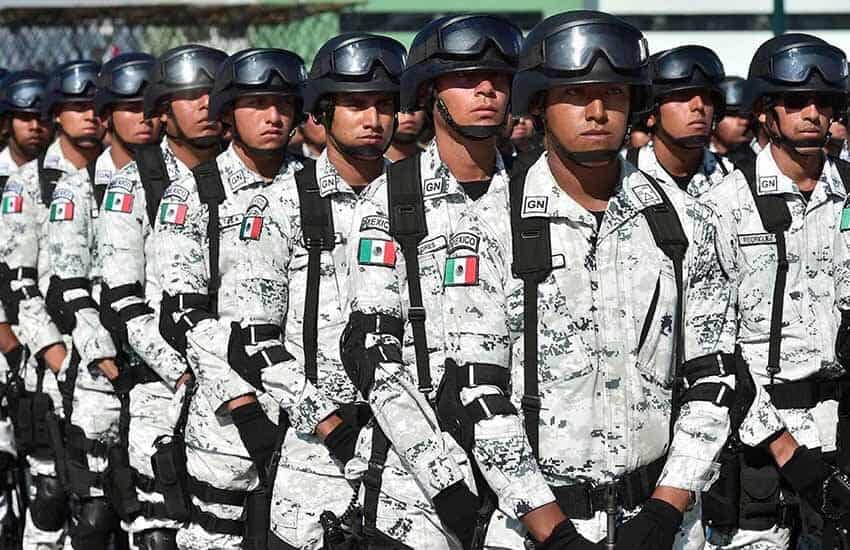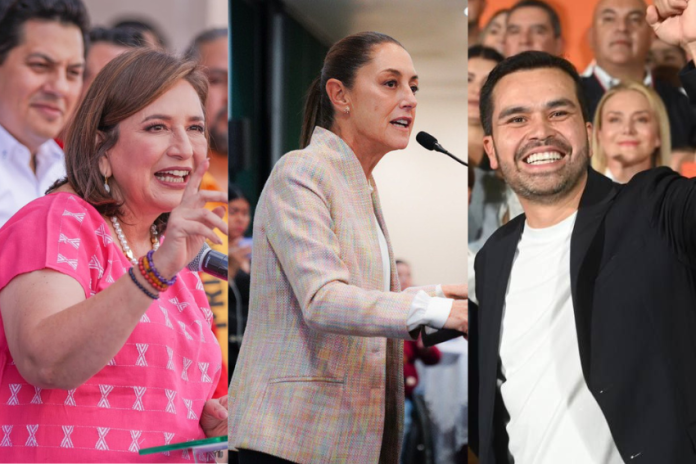The official campaign period for Mexico’s upcoming federal election began Friday, exactly 93 days before voters will go to the polls to elect a new president for the next six years.
Just three candidates are in the running to become Mexico’s next president, and that person — in all likelihood — will be a woman for the first time ever.
Xóchitl Gálvez, presidential candidate for the three-party Strength and Heart for Mexico opposition alliance, got her campaign off to a flying start, holding a launch event in Zacatecas that began at the stroke of midnight.
Claudia Sheinbaum, candidate for the ruling Morena party and the clear favorite to win the June 2 election, will launch her campaign with a rally in Mexico City’s central square, the Zócalo, on Friday afternoon, while the third candidate, Jorge Álvarez Maynez of the minor Citizens’ Movement party, will begin his campaign in a notoriously violent municipality in Jalisco.
Violence and insecurity are set to be central themes in the three-month-long presidential campaign, as Mexico’s murder rate remains alarmingly high, even as homicides declined on a year-over-year basis in 2023.
The economy, poverty and inequality, the tax system, the judicial system, migration, health care, education, the relationship with the United States, nearshoring and the legacy of President López Obrador are among the other issues set to feature in the three-way contest.

In addition to voting for a new president, citizens will renew both houses of federal Congress on June 2, electing 500 deputies and 128 senators. Thousands of municipal and state positions including eight governorships and the mayorship of Mexico City will also be up for grabs in Mexico’s largest-ever elections on the first Sunday in June.
The official campaign periods for most of the municipal and state elections will begin later in March or in April, although those for the mayoral race in Mexico City and the gubernatorial contest in Yucatán also began Friday.
Xóchitl Gálvez’s coalition: National Action Party (PAN), Institutional Revolutionary Party (PRI) and Democratic Revolution Party (PRD)
The 61-year-old Hidalgo native has made it clear that she wants to make this election — at least in part — a referendum on who has the best plan to combat Mexico’s high levels of violence and insecurity.
Launching her campaign in the notoriously violent city of Fresnillo, the former PAN senator presented her security strategy and declared that “a Mexico without fear is possible, and we’re going to achieve it.”
Gálvez, if elected, plans to continue using the military for public security tasks, but says she will relieve them of other duties such as building infrastructure, fixing roads and running hotels.
She also intends to increase the size of the National Guard — a security force created by the current government — and develop its capacity to investigate crimes and arrest criminals.

“Hugs for criminals are over, the law will be applied for them,” Gálvez said early Friday, referencing López Obrador’s non-confrontational security strategy known colloquially as “hugs, not bullets.”
“… To have a Mexico without fear, we’re going to contain the most violent and aggressive criminal organizations in our country,” she said.
“We will especially go after those organizations that extort and threaten citizens as well as those that attack people on highways,” Gálvez said.
Among the other aspects of her security strategy are plans to increase funding for states to improve their crime-fighting capacity and to pay police higher salaries.
The coalition she represents includes parties both on the right (PAN) and left (PRD) of the political spectrum. The three parties first joined forces before the 2021 midterm elections, after the candidates they backed in the 2018 presidential election were comprehensively beaten by López Obrador.
Claudia Sheinbaum’s coalition: National Regeneration Movement (Morena), Labor Party (PT), Ecological Green Party of Mexico (PVEM)
Poll results show that Sheinbaum has a double-digit advantage over Gálvez, making her the heavy favorite to win on June 2 and thus become Mexico’s first ever female president.
The main reason for her popularity is undisputed — she represents a continuation of the political project initiated by her former boss and mentor, López Obrador, best known as AMLO, who has maintained high approval ratings throughout his presidency even as violence remained a major problem and the country endured a difficult COVID-19 pandemic.
Sheinbaum — a 61-year-old Mexico City native who was mayor of the capital between 2018 and 2023 and served as environment minister when López Obrador was mayor in the early 2000s — is steadfastly committed to building what she calls the segundo piso, or second story, of AMLO’s political project, known as the “fourth transformation,” or 4T.

She is also committed to continuing to invest heavily in the welfare and social programs created or strengthened by the current government — programs that are highly popular among tens of millions of low-income Mexicans who make up a large part of López Obrador’s political base.
Sheinbaum has also expressed her support for the package of constitutional reform proposals AMLO sent to Congress last month, among which are ones aimed at guaranteeing that annual minimum salary increases outpace inflation; overhauling the pension system so that retired workers receive pensions equivalent to 100% of their final salaries; and allowing citizens to directly elect Supreme Court justices and other judges.
The Morena candidate on Thursday announced some new additions to her campaign team, including former foreign affairs minister Marcelo Ebrard, who had remained distant from Shienbaum after finishing second in the contest to secure the ruling party’s nomination.
Sheinbaum’s team also includes ex-interior minister Adán Augusto López and former economy minister Tatiana Clouthier. The coalition she represents — dominated by the leftist Morena party — is called Sigamos Haciendo Historia, or Let’s Keep Making History.
Jorge Álvarez Maynez: Citizens Movement (MC)
Álvarez is the most recent entrant to the 2024 presidential contest, entering the fray in January after Nuevo León Governor Samuel García — the original MC candidate — pulled out of the race amid political turmoil in his home state.
At 38, the former federal lawmaker is much younger than Gálvez and Sheinbaum, and he is clearly courting the votes of younger Mexicans, who make up a significant part of the electorate.
Álvarez, who had just 5% support among respondents to one recent poll, launches his campaign in Lagos de Moreno, a municipality in Jalisco that is plagued by violent crime.
Despite his low poll numbers, he remains outwardly confident that he can be competitive in the June 2 election.
“Campaigns are won in the field and they last 90 days — and even the last minute has 60 seconds. This isn’t over until it’s over,” Álvarez says in a new political ad.
With reports from Expansíon Política
